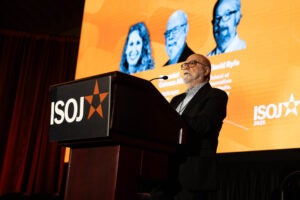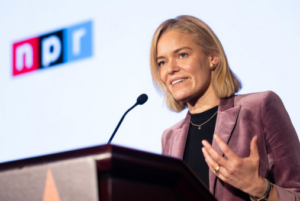Nearly 900 people join ISOJ 2025 to discuss timely, urgent topics affecting journalism around the world
Haga clic aquí para leer este artículo en español.
Nearly 60 countries were represented by close to 900 participants of the 26th International Symposium on Online Journalism (ISOJ), which featured leading media executives, journalists, scholars and students coming together to explore the latest challenges–and opportunities– for journalism brought on by AI, threats to democracy, digital content creators and more.
ISOJ 2025, organized by the Knight Center for Journalism in the Americas, took place online and at the University of Texas at Austin, March 27-28, 2025.
Coming from 58 countries, 422 people attended ISOJ 2025 in person in Austin, Texas, and another 455 people participated online as part of the ISOJ Virtual Experience.

“In the 26-year history of ISOJ, the topics have never been as urgent and timely as in 2025,” said Professor Rosental Alves, founder and director of ISOJ and the Knight Center. “For example, the CEO of NPR and AP’s executive editor came to ISOJ at the end of a week during which both organizations had to fight back and respond to serious attacks from the government. A couple of days before coming to Austin, the top executive of the U.S. public radio network was grilled in the U.S. Congress by hostile politicians, and a day before the Associated Press had its day in court to oppose the hostility of President Donald Trump’s White House.”
“But the focus on urgent topics was not only on the United States,” he continued. “We had brave journalists from around the world who told their stories of heroic resistance to increasing attacks on press freedom.”
The conference, which was held in English with simultaneous interpretation to Spanish, featured 71 speakers from 18 countries. The program included three keynote speakers, 1 keynote panel, 1 special guest session, 11 panels, three workshops, a theatrical presentation, and a research breakfast session that included a tribute honoring late UT Austin Professor Max McCombs, a pioneer in research on the agenda-setting role of mass communication.

This year’s keynote speakers were Katherine Maher, president and CEO of National Public Radio (NPR); Versha Sharma, editor in chief of Teen Vogue; and Terry Tang, executive editor of the Los Angeles Times. The conference opened with a keynote panel on funds created around the world to finance journalism chaired by Jim Brady, vice president of journalism at the Knight Foundation, and including Dale Anglin, director of Press Forward; Vanina Berghella, regional director for Latin America & the Caribbean, International Fund for Public Interest Media (IFPIM); Sarabeth Berman, CEO of the American Journalism Project (AJP); and Carolina Oms, director of partnerships and fundraising, Brazilian Journalism Support Fund.
Additionally, the conference featured a special session with Julie Pace, executive editor for the Associated Press, in conversation with Evan Smith, co-founder of The Texas Tribune and senior advisor of the Emerson Collective.
Sessions focused on the impact of artificial intelligence, doing journalism in democracies in decline, covering the second administration of Trump, changing definitions of who is a journalist, news avoidance, fact checking, and more.

All ISOJ participants, including remote attendees, were able to network, discuss sessions and ask questions of the speakers in the ISOJ Slack workspace. Online participants also had access to six exclusive 15-minute Meet and Greet sessions with select speakers. There were also giveaways for in-person and online participants.
Recordings of all panels, sessions and workshops are now available to ISOJ 2025 registrants and will soon be available to the public.
The Knight Center’s editorial team – made up of writers for the Knight Center’s digital magazine LatAm Journalism Review and student volunteers – is working to publish and translate articles about each session. Coverage can be found in English and Spanish at isoj.org/news and in Portuguese here.
Additionally, our social media team is still hard at work publishing first-hand accounts from the conference on Instagram, X/Twitter, Facebook and LinkedIn.

The exciting post-ISOJ conference in Spanish, the 18th Iberoamerican Colloquium on Digital Journalism, took place March 29, 2025, the day after ISOJ ended. The colloquium, organized by the Knight Center and the Teresa Lozano Long Institute of Latin American Studies at UT Austin, featured 28 speakers from nine Latin American countries. Speakers touched on doing journalism in exile, press freedom, funding, sustainability, research on the journalism in the region and more.
A recording of the Colloquium is posted on our YouTube channel. Coverage of the Colloquium will be posted in English and Spanish at isoj.org/news in the coming days.
The Knight Center wants to thank the sponsors of the 26th ISOJ: Knight Foundation; Google News Initiative; International Fund for Public Interest Media (IFPIM); Texas Global; American Press Institute (API); John S. Knight (JSK) Journalism Fellowships at Stanford University; Moody College of Communication at UT Austin; Council on Foreign Relations (CFR); Uber/Waymo; and Yahoo News.
We also want to express gratitude to our media and organization partners: KUT; Inter-American Press Association; and The Texas Tribune.
ISOJ is also made possible thanks to the help of more than 50 volunteers, most of whom are students from UT Austin’s Moody College of Communication.
Dates for the 27th ISOJ will be announced shortly.
For all ISOJ updates, check out isoj.org or subscribe to the ISOJ newsletter in English or Spanish.
Casi 900 personas se unieron a ISOJ 2025 para debatir temas de actualidad que afectan el periodismo a nivel mundial
Casi 60 países estuvieron representados por cerca de 900 participantes en el 26º Simposio Internacional de Periodismo Online (ISOJ) que reunió a destacados ejecutivos de medios, periodistas, académicos y estudiantes para explorar los últimos desafíos y oportunidades para el periodismo que plantea la IA, las amenazas a la democracia, los creadores de contenido digital y más.
ISOJ 2025, organizado por el Centro Knight para el Periodismo en las Américas, se llevó a cabo de manera virtual y en la Universidad de Texas en Austin, del 27 al 28 de marzo de 2025.
Procedentes de 58 países, 422 personas asistieron presencialmente a ISOJ 2025 en Austin, Texas, y otras 455 participaron en línea como parte de la Experiencia Virtual ISOJ.
“En los 26 años de historia de ISOJ, los temas nunca han sido tan urgentes y oportunos como en 2025”, dijo el profesor Rosental Alves, fundador y director de ISOJ y del Centro Knight. “Por ejemplo, la directora ejecutiva de NPR y la editora ejecutiva de AP acudieron a ISOJ al final de una semana en la que ambas organizaciones tuvieron que defenderse y responder a graves ataques del gobierno. Un par de días antes de su llegada a Austin, la máxima ejecutiva de la radio pública estadounidense fue interrogada en el Congreso por políticos hostiles, y un día antes de que Associated Press tuviera su día en los tribunales para oponerse a la hostilidad de la Casa Blanca del presidente Donald Trump”.
“Pero el enfoque en los temas urgentes no se limitó a Estados Unidos”, continuó. “Contamos con la presencia de valientes periodistas de todo el mundo que compartieron sus historias de heroica resistencia ante los crecientes ataques a la libertad de prensa”.
La conferencia, que se celebró en inglés con interpretación simultánea a español, contó con 71 ponentes de 18 países. El programa incluyó tres ponentes magistrales, un panel principal, una sesión con invitados especiales, 11 paneles, tres talleres, una presentación teatral y un desayuno de investigación que incluyó un homenaje al fallecido profesor de la Universidad de Texas en Austin, Max McCombs, pionero en la investigación sobre el papel de la comunicación de masas en la definición de la agenda periodística.
Las ponentes magistrales de este año fueron Katherine Maher, presidenta y directora ejecutiva de la Radio Pública Nacional de Estados Unidos (NPR); Versha Sharma, editora jefe de Teen Vogue; y Terry Tang, editora ejecutiva de Los Angeles Times. La conferencia se inauguró con un panel principal sobre los fondos creados en todo el mundo para financiar el periodismo, moderado por Jim Brady, vicepresidente de periodismo de la Fundación Knight, y que incluyó a Dale Anglin, director de Press Forward; Vanina Berghella, directora regional para América Latina y el Caribe del International Fund for Public Interest Media (IFPIM); Sarabeth Berman, directora ejecutiva del American Journalism Project (AJP); y Carolina Oms, directora de alianzas y recaudación de fondos del Fondo de Apoyo al Periodismo Brasileño.
Además, la conferencia contó con una sesión especial con Julie Pace, editora ejecutiva de Associated Press, quien conversó con Evan Smith, cofundador de The Texas Tribune y asesor principal de Emerson Collective.
Las sesiones se centraron en el impacto de la inteligencia artificial, cómo hacer periodismo en democracias en declive, cobertura del segundo gobierno de Trump, la transformación de la definición de periodista, evasión de noticias, verificación de datos y más.
Todos los participantes de ISOJ, incluidos los asistentes remotos, pudieron establecer contactos, debatir sobre las sesiones y hacer preguntas a ponentes en el espacio de trabajo de Slack de ISOJ. Los participantes en línea también tuvieron acceso a seis sesiones exclusivas Meet and Greet de 15 minutos con ponentes seleccionados. También hubo sorteos para los participantes presenciales y en línea.
Las grabaciones de todos los paneles, sesiones y talleres ya están disponibles para los inscritos en ISOJ 2025 y pronto estarán disponibles para el público.
El equipo editorial del Centro Knight – compuesto por redactores de la revista digital del Centro Knight, LatAm Journalism Review, y estudiantes voluntarios – está trabajando en la publicación y traducción de artículos sobre cada sesión. Puede encontrar la cobertura en inglés y español en isoj.org/news y en portugués aquí.
Además, nuestro equipo de redes sociales continúa trabajando arduamente para publicar relatos de primera mano de la conferencia en Instagram, X/Twitter, Facebook y LinkedIn.
La emocionante conferencia posterior a ISOJ en español, el 18º Coloquio Iberoamericano de Periodismo Digital, tuvo lugar el 29 de marzo de 2025, un día después de la clausura de ISOJ. El coloquio, organizado por el Centro Knight y el Instituto de Estudios Latinoamericanos Teresa Lozano Long de la Universidad de Texas en Austin, contó con 28 ponentes de nueve países latinoamericanos. Los ponentes abordaron temas como el periodismo en el exilio, libertad de prensa, financiamiento, sostenibilidad, investigación sobre el periodismo en la región y más.
La grabación del Coloquio está publicada en nuestro canal de YouTube. La cobertura del Coloquio se publicará en inglés y español en isoj.org/news en los próximos días.
El Centro Knight quiere agradecer a los patrocinadores de la 26ª edición de ISOJ: Fundación Knight; Google News Initiative; International Fund for Public Interest Media (IFPIM); Texas Global; American Press Institute (API); John S. Knight (JSK) Journalism Fellowships de la Universidad de Stanford; Moody College of Communication de la Universidad de Texas en Austin; Council on Foreign Relations (CFR); Uber/Waymo; y Yahoo News.
También queremos expresar nuestra gratitud a nuestros medios y organizaciones aliadas: KUT; Sociedad Interamericana de Prensa; y The Texas Tribune.
ISOJ también es posible gracias a la ayuda de más de 50 voluntarios, quienes la mayoría son estudiantes del Moody College of Communication de la Universidad de Texas en Austin.
Las fechas de la 27ª edición de ISOJ se anunciarán próximamente.
Para obtener todas las novedades de ISOJ, visite isoj.org o suscríbase al boletín informativo de ISOJ en español e inglés.

